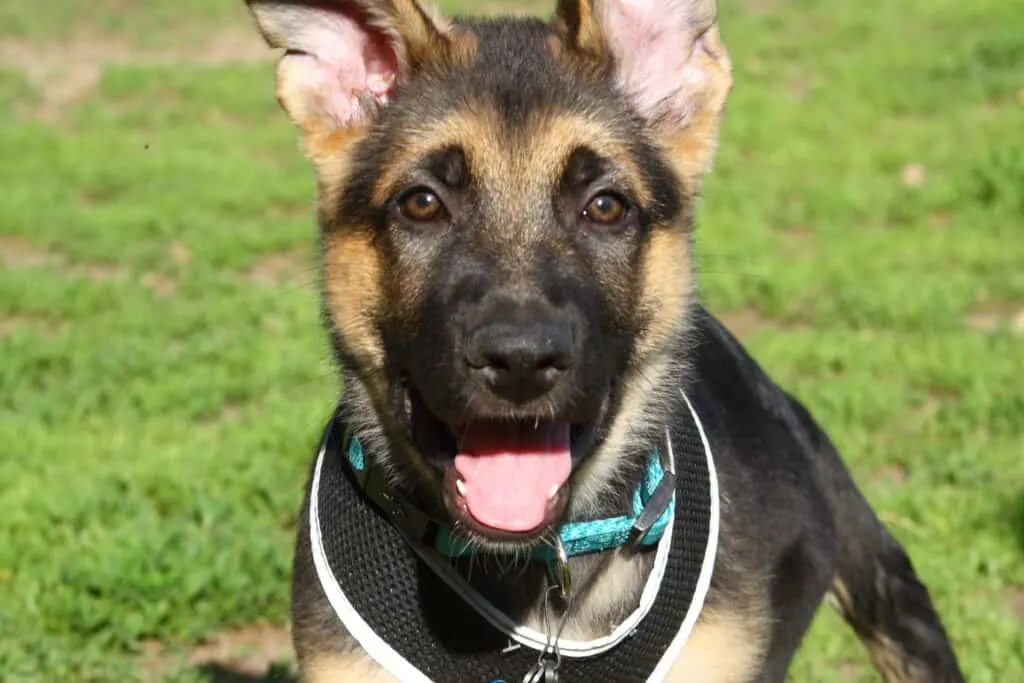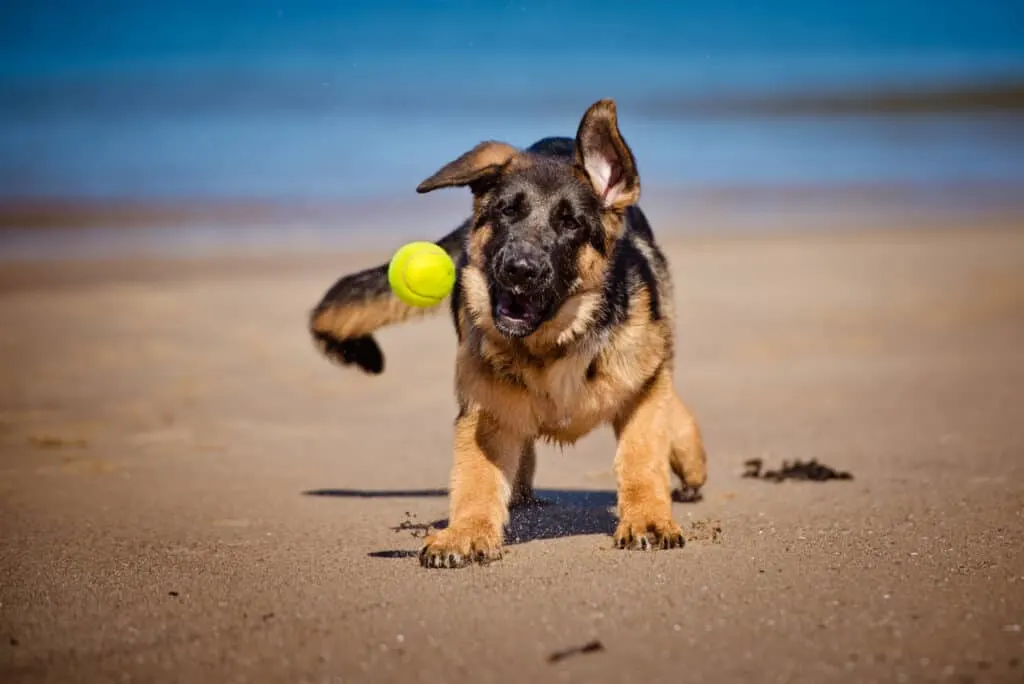
So you are eagerly awaiting the arrival of your new German Shepherd puppy – or perhaps you’ve just welcomed him or her into your household as your newest best friend and family member.
While all you may want to do is play with your puppy for hours on end, there is much work to be done if you want your puppy to grow into the capable and intelligent dog that he has all the potential in the world to be. But this requires you to do your part.
Properly training a GSD puppy is essential. Not only will doing so work to ensure that your puppy listens to you, doesn’t pick up destructive habits, and is just an overall good dog – it will also ensure that your GSD will not present a danger to other people and animals. This is your responsibility, and you should not take it lightly.
In this article, we will give you some really helpful tips and instructions to make this happen. It is work, but it’s the kind of work that you will love doing, and it will serve both you and your GSD well for a lifetime to come.
Understand Your German Shepherd’s Learning Curve
German Shepherds are smart dogs. In fact, they are very smart and rightly considered one of the most intelligent dog breeds on the planet. This is for good reason, as it’s also the reason that they are used in so many different applications that draw on this intelliegence.
From military use, to police use, to farm use, to use as service dogs, German Shepherds have served mankind for over 100 years. However, because GSDs are so intelligent, they can also be stubborn. Therefore, training them needs to be approached from an intelligent and loving, yet firm place.
It is very important for you to understand just how intelligent your GSD is. Your GSD is capable of problem solving and is able to function independently. This means that you must allow your GSD’s intelligence to work for him and not against him. You can make sure that you are doing this by keeping in mind that your puppy, just like you, has a learning curve.
Give your GSD an opportunity to hit his own learning stride, and do not expect him to learn on your schedule. By understanding how your GSD’s intelligence functions in this manner, you will be setting both you and your dog up for training success!
Understand That Your German Shepherd Is a Working Dog

German Shepherds were bred to work. Specifically, they were bred to herd and guard other animals. This eventually evolved into personal protection and many other applications as well.
The point in telling you this is so that you understand that work is not only a good thing for a GSD, it is essential to a GSD’s well-being. A GSD without a job to do will often times become depressed, destructive, and sometimes dangerous. Your GSD wants first and foremost to work for and to please you, his owner.
You should always keep this in mind when training your German Shepherd puppy. Know that your GSD likes to learn, and the more complex the task, the more your GSD will benefit from it.
Keep Yourself in a Calm State of Mind at All Times

It’s important to understand that your GSD’s behavior, while it is individual to him, is really a reflection of you. This is an absolute for most all dogs, but especially with GSDs! They are intuitive, and they are always paying attention to you. Since you are your GSD’s leader, your dog’s actions and reactions will be a reflection of your own emotions.
So if you find that your German Shepherd is not listening as you would like, or is not reacting to commands in a way that you find appropriate, it is truly time to take a look at yourself. Chances are that if you look closely enough, you will find that your dog is tense when your are tense, calm when you are calm, and excited when you are excited.
Treat this as an opportunity to address unhealthy emotions within yourself. This will pay off immensely for both you and your GSD when approached correctly.
Think about it, when is the last time you came across a truly happy and well-adjusted dog owner that didn’t have a happy and well-adjusted dog? Keep this in mind and your GSD puppy will thrive in his training.
Your German Shepherd Puppy Needs a Leader – That Leader is You!

Your German Shepherd puppy by default will view you as his leader. As noted above, he will emulate your emotions. He will also follow your lead, provided that he trusts you.
It is key to remember here that establishing yourself as a leader in your GSD’s eyes does not mean that you should show dominance over him. In fact, doing this will only frighten your GSD and make him untrusting of you.
So how do you do this? It’s simple – treat your GSD with the same respect that you expect from him. For you, this means exercising patience, persistence, and simply not giving up on your dog.
While all German Shepherds are extremely intelligent, they need this intelligence drawn out from them in a very nurturing manner in order to live up to their full potential. Once you show your GSD that you are worthy of being a good leader, he will trust you and remain just as loyal to you as you have shown that you are to him.
With this in mind, it is important that you never yell at your GSD and never, ever hit your dog – not matter what! Doing either of these things will only erode any trust that you may have established, and it will make your GSD especially skeptical of you and therefore much harder to work with.
Understand How Your German Shepherd Communicates
As much as well like to talk to our dogs, sometimes asking them the same types of questions that we would ask our human friends, it is important that you learn to speak your GSD’s language.
Your German Shepherd is very intuitive. While he will understand singular words, and even full sentences, these are simply interpreted as cues by your dog. What your German Shepherd is really reading and understanding when you talk with him is the inflection of your voice and your body language.
It’s not so much what you say to your GSD, it’s how you say what you say to your GSD. I have seen a German Shepherd stare blankly into the eyes of his owner and do nothing as his owner repeatedly yelled “SIT!” at him. I took that same dog moments later and calmly asked him to sit, which he then very compliantly did upon my first gentle and calm request.
Think of how you would respond in that situation had you been the dog. Would you be more inclined to listen to someone screaming something at you, or would you be more likely listen to that same request asked of you in a calm and respectful manner?
Consistency Is Everything
Think about what you know best – any skill or activity that you do or know very well. Chances are that whatever this skill or activity is, you’ve practiced it – a lot.
Whether you’ve intentionally sat down and poured hours and hours into acquiring knowledge, or whether you just know something very well because you’ve simply always been exposed to it throughout your life – the key take away from this is that you developed your skill through consistency.
Your German Shepherd is no different. Consider yourself reading an instruction manual of some sort just one time. You may be able to execute the information contained in it fairly well for a short time after you read it. However, how well do you think that you would retain that same information after, let’s say, one week? Likely not very well.
On the other hand, take that same set of instructions and consider reviewing it each day for one week. Chances are highly likely that you would retain that information and have the ability to execute on it for a considerably longer period of time. This is because your learning was consistently reinforced each time that you reviewed the manual.

When Something Works – Repeat It. When Something Works – Repeat It!
Your German Shepherd’s learning capacity follows the same rules. You could spend all day teaching your GSD to sit, and he may follow your instructions very well for that day. However, if you don’t ask your GSD to sit again for one month, it would be unreasonable to expect him to remember your command.
Consistency is key when training your German Shepherd. Once you have taught something to your GSD, you need to consistently reinforce the behavior by practicing it with your dog over and over again until it becomes second nature.
Because GSDs are so highly intelligent, they take to learning new behaviors quickly, but you cannot overlook your part and therefore must stay consistent with your training.
Choose Your Learning Environment Wisely
Like you, in order to learn something, your GSD will excel in an environment that is conducive to learning. Ideally, you would not go to the food court of a busy mall to sit down and study for an upcoming exam. Instead, you would choose a quiet room in your home, or perhaps a library or coffee shop. Why would you do this? Because there are no distractions.
Similarly, you must choose an environment that is conducive to learning for your German Shepherd in order to give him the best chance for success. What this means, practically speaking, is that you want to choose an environment such as a quiet room in your home, or even your own backyard. The idea being that it must be some place that your GSD is familiar with and that will not lend itself to distractions.
You should not consider training your GSD around people that he is unfamiliar with or in a new or busy environment, such as a dog park full of other dogs competing for your GSD’s attention.
Positive Reinforcement
When your German Shepherd does something correctly, it is very important that you provide him with the understanding that he has done something right. Remember that your GSD is a working dog, and that he loves his job. Nothing makes him happier that pleasing his leader, and the best way for you to let your GSD know that he is employee of the year is to reward him with praise, or positive reinforcement.
What this means is that you should take a moment after your GSD does something right and acknowledge it by either praising your dog, giving him a treat, or some combination of both. Initially, treats will work best. However, as time goes on, your GSD will respond just as well to a simple “good boy” and a pat on the head.
This is because your GSD is not actually obeying you in order to receive a reward, but deep down he is obeying you because he wants to please you.
Keep this in mind, and remember that even the smallest of acknowledgements of good behavior eventually add up. So once again – stay consistent. By doing this you will be giving your GSD the best opportunity to live up to his full potential.
Never Yell at or Physically Scold Your Dog
It is very important that you keep in mind that your German Shepherd, like you, is an emotional creature. Think about how you learn and function best. Chances are that you are most receptive to new things if they are presented to you in a calm and deliberate manner – and you probably wouldn’t take to well to someone yelling at you or even hitting you in an effort to get you to learn something.
Your German Shepherd is just the same. If you are frustrated and then take that out on your GSD by yelling, this is just about the most counterproductive thing that you can do. In fact, it will likely have the effect of undoing a lot of effort that the both of you will have put in to the learning process.
So please remain calm at all times. If your dog is not performing a behavior to your satisfaction, then perhaps evaluate your approach instead of thinking that it is your GSD’s fault.
As mentioned above, training your German Shepherd is a great opportunity for you take a look at yourself and maybe even make yourself a better person during the process.
Lastly, NEVER physically scold your dog. Doing so may lead to a number of undesirable results. Aside from undermining the training process, it will lead to your dog just not trusting you. If your GSD doesn’t trust you, he will no longer be receptive to anything that you try to teach him.
Even worse, physical punishment will make your GSD frightened and dangerously reactive. A German Shepherd, like any dog, will defend himself when he is fearful of something. The last thing that you want on your hands is a fearful and aggressive German Shepherd, as this will be a danger to you and the public in general.
We feel very strongly about animal abuse and advocate for the prevention of animal cruelty. If you know of any animal that is being abused, please do your part and report it. If you suspect animal abuse, please contact your local animal control agency, or if you are unable to locate this number and it is an emergency, then dial 9-1-1.
Understand Your German Shepherd’s Body Language

We’ve discussed keeping yourself calm and under control, as your GSD is very adept at reading your emotional state. He will pick up on cues from your body language just as easily as he will pick up on the inflection of your voice.
This goes both ways. It is very important that you are able to understand and accurately interpret your GSD puppy’s body language. Unlike a person, a dog will not smile when he’s happy, and he will not frown when he’s sad.
For example, if your GSD has his tail hanging in a middle position, neither high nor low, then this could be a cue that he is feeling either fear, arousal, aggression, or even playful. Obviously these emotions cover the spectrum from fearful to playful – it seems rather ambiguous because it is.
This example illustrates the importance of understanding your particular dog’s body language, as it is often the surrounding context and environment that will provide the true meaning of a cue such as a middle hanging tail.
This cue, like many others, is often subtle, so it is imperative that you take the time to clearly understand what your GSD is feeling by getting to know his body language.
We’ve taken the guesswork out of this for you here in this article about German Shepherd body language. Give it a thorough read before you begin any training regiment with your GSD, as it provides clear explanations for even the most subtle of body language cues.
Don’t Forget to Play!

Okay, we’ve placed a lot of focus on the do’s and don’ts of training your German Shepherd. It is, however, important to understand that, at the end of the day, this is all about fun! You own a German Shepherd to bring joy into your life, and what is more joyful than playtime?
Our point here is that you should not get too serious about anything. Take our suggestions seriously, but keep a light heart. If your dog isn’t learning something as quickly as you would like, perhaps he just needs a break.
So instead of getting frustrated and repeating the same thing and hoping for different results, take some time to give your GSD some love. Perhaps throw a ball for him or break out his favorite toy. By doing this, you will ensure a well-rounded mix of learning and fun, two things that, when combined, will produce amazing results.
Final Thoughts
While some of the above-mentioned rules for German Shepherd puppy training may seem like they are common sense, none of them should be taken lightly.
By consistently paying attention to the points that we have suggested in this article and not losing sight of them, no matter what, you will be doing both you and your German Shepherd a great service.
You will be making sure that you are giving your GSD the best opportunity to learn and grow into the dog that you dreamed of when you first considered owning a German Shepherd.
So take your time and be patient – and we assure you that it will be well worth your time and effort!
